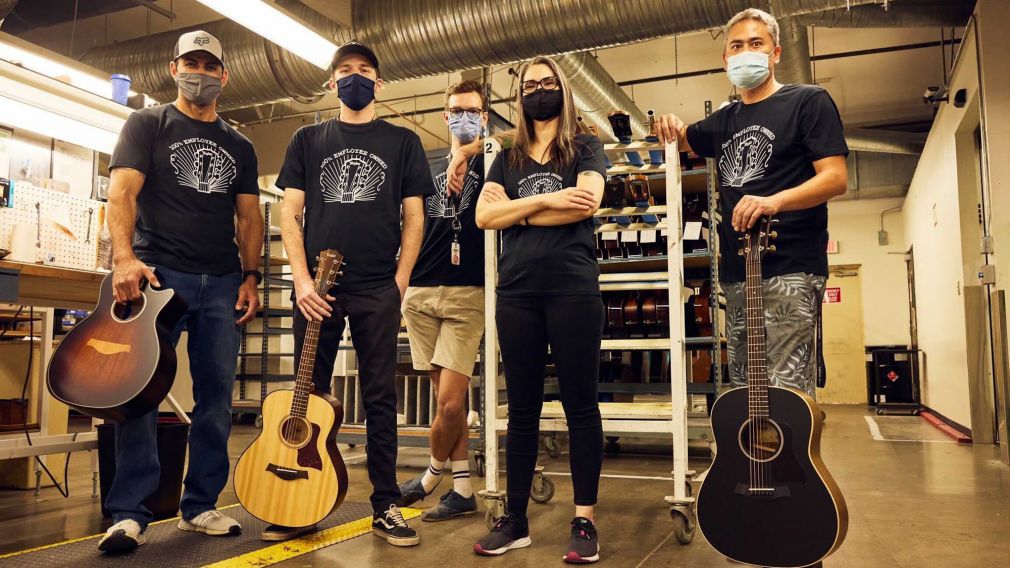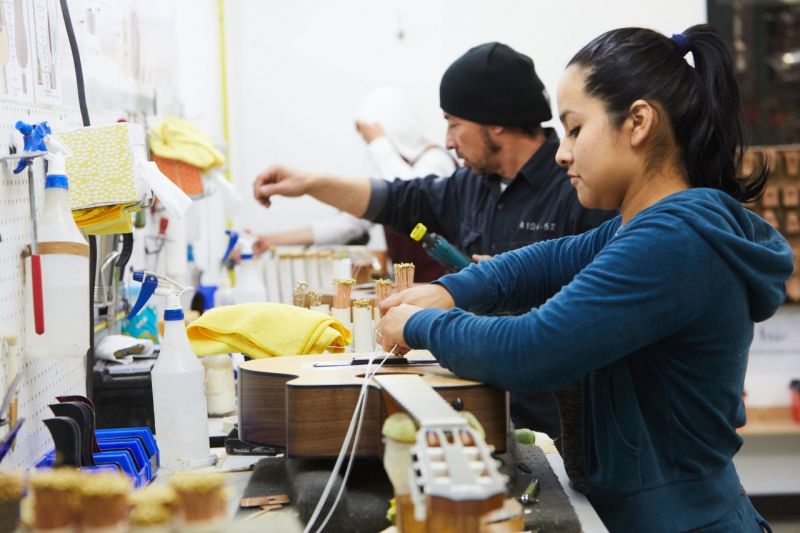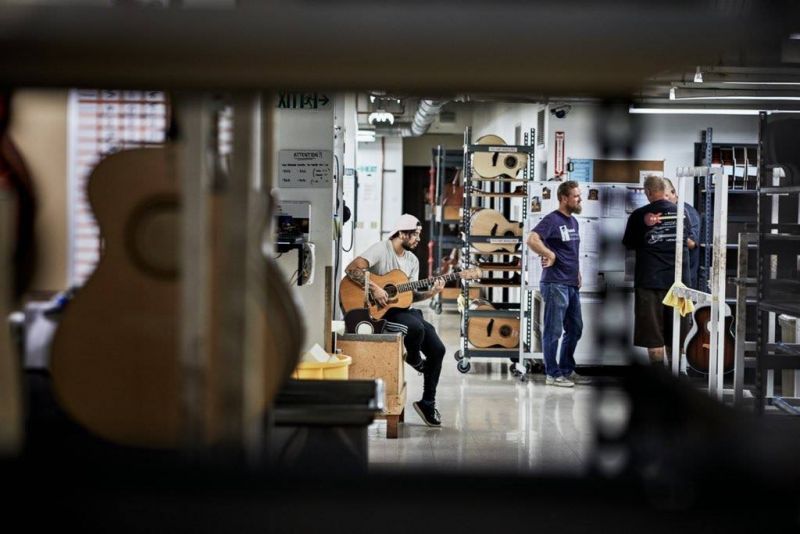Taylor Guitars Employees Take Ownership of Company

The new year marked a milestone for Taylor Guitars, the San Diego-based leading global manufacturer of acoustic guitars as Bob Taylor, Kurt Listug, and Andy Powers officially transferred ownership to their employees through an Employee Stock Ownership Plan (ESOP).
Founded in 1974 by Taylor and Listug, Taylor Guitars is known for “blending modern, innovative manufacturing techniques with a master craftsman’s attention to detail.” With facilities in El Cajon, California, Tecate, Mexico, and the Netherlands, Taylor Guitars is equipped to serve customers globally.
In a video message to its employees-turned-owners, Taylor shared, “It’s a huge day in the history of Taylor Guitars. A day that Kurt and I have been thinking about and planning for a long time.” Taylor and Listug provided great praise for Powers, who joined the Taylor team a decade ago to succeed Bob as master guitar designer, then in 2019 became the third partner. Listug credits the success of Taylor to its employees, saying, “While Bob and I still have many good years left to dedicate to the company, we wanted to make sure we put the company in the best possible position for future success.” Powers shared the positive sentiment stating, “We have something special here, and together we have an opportunity to keep moving that forward for everyone's benefit.”
We spoke with Jim Kirlin, Taylor Guitars editorial director, on the trio's decision to transition to the ESOP program. “It’s important that any successful first-generation company, especially one with a creative culture, address the question of what will happen once the founders are gone. Bob, Kurt, and Andy wanted to create a plan that would put the company, and its employees, in the best position for success well into the future. Employee ownership enables Bob, Kurt, and Andy to provide for employees in an even more substantive and meaningful way while still guiding the company forward, as they have no plans to retire. Bob and Kurt believe that the ESOP and their continued leadership will provide long-term financial security for all employees, including those in Mexico and the EU.”
Active planning for the transition to 100% employee ownership began about seven years ago. However, the COVID-19 pandemic put all progress on hold as Taylor was forced to suspend guitar production. According to Kirlin, “The company’s quick response and recovery, together with the worldwide surge of interest in playing guitar, enabled the company to reactivate that plan and ultimately meet its original goal.

We sat down with Taylor Guitars employees (and now owners) about the impact of the ESOP program.
What does it mean to own a stake in Taylor Guitars?
Chris Tully (Product Development Engineer): I look to the history of Taylor Guitars. Since joining Taylor, I’ve noticed the insane presence of Taylor on sets or in the studios. Taylor has and will continue to make and distribute the best guitars money can buy and knowing that a part of my financial future is in the hands of that same company is awesome.
Brandon Colao (Recruiter): It’s a new concept, and we are still learning the possibilities. As a recruiter, it means adding the question, ‘Do I want to own a company with this person?’ to the screening process.
David Pelletier (Director of Sales): I’m so grateful for Bob, Kurt, and Andy's foresight and generosity and for the undercover team at Taylor who tackled a complex, long-running project. The ESOP reinforces the type of company I believed Taylor Guitars to be when I joined in 2015. 100% employee ownership also means not having to wonder what the succession plan is because we are the succession plan!
As a new owner through the ESOP, do you feel a deeper connection with Taylor Guitars?
Lindsay Love-Bivens (Artist & Community Relations Manager): I feel a renewed sense of pride in our company, and that’s directly tied to ownership. It’s one thing to work for a company you like and help build their brand, but it’s more meaningful to own something and have it directly impact your future.
BC: Being called an owner adds a new level of personal responsibility and accountability to how we all approach our jobs every day. The better we perform, the better our company performs, and that ultimately benefits us all.
DP: Even in the current remote work environment, the connection with my teammates is stronger than ever. We’ve begun to refer to each other as co-owners. At first, it was a novel term, but now there’s an underlying sense of responsibility and pride that accompanies it.
How do you feel the ESOP will benefit current and future customers?
CT: Customers can be excited to know that the company is in good hands, the very same hands that helped Bob, Kurt, and Andy get to where we are today.
LL: It says a lot that Bob, Kurt, and Andy carefully looked at all options regarding the future of Taylor and landed on an ESOP. They believed the best way to preserve Taylor's culture, quality, and integrity was to put the company in the hands of the employees. So, I think customers can remain confident that Taylor will continue to live the values of our founders.
DP: Employee ownership is the ultimate expression of a company ‘putting its money where its mouth is.’ This resonates with our customers and draws them to our brand. It also assures customers about the continuity of our culture and how we’ll continue to do business well into the future.

Taylor Guitars and its new owners are committed to bringing customers the same level of craftsmanship they have come to love from the brand. “ESOP aims to keep guitar-making innovation at the center of what we do. That means we will remain committed to our quality standards and to serving customers by making player-friendly instruments that will inspire people to express themselves musically for generations to come,” says Kirlin.
Barbara Wight, Taylor Guitar’s Chief Financial Officer, provided insight for others looking to transition ownership of their company to its employees. “First, I would recommend that you work with a good advisor. The firm Taylor used, Chartwell Financial Advisors, helped our founders strategize the best way to achieve all their objectives. ESOPs can be complex, so it is important to get the structure set up right from the beginning but don't rush. It can take months or years to work through the issues and set the best structure for the existing shareholders, the employees, and other stakeholders. For example, a company can be a partial ESOP instead of 100% employee-owned or start as a partial ESOP and transition to 100% employee-owned over time; it all depends on which model is best suited for all stakeholders. It is worth noting that ESOPs provide amazing tax benefits to existing shareholders, the company, and the employees, so be sure to maximize the tax benefits in your ESOP design.”
For more information from Taylor Guitars, please visit https://www.taylorguitars.com/.